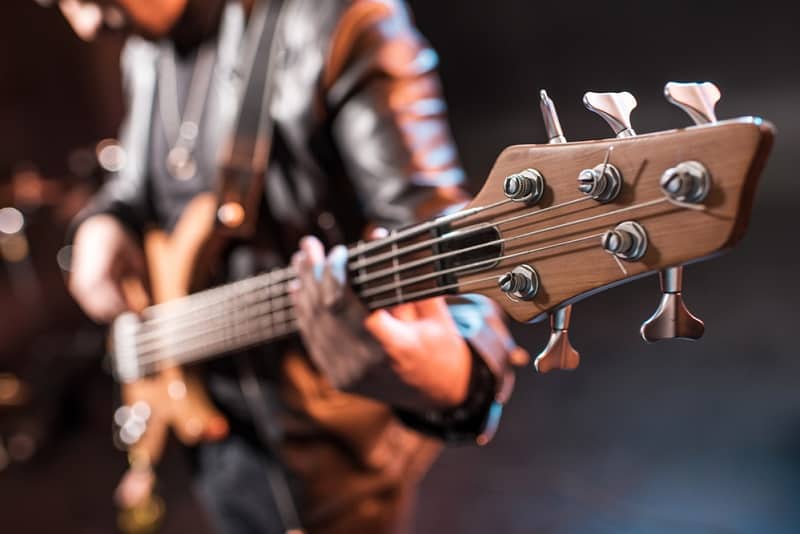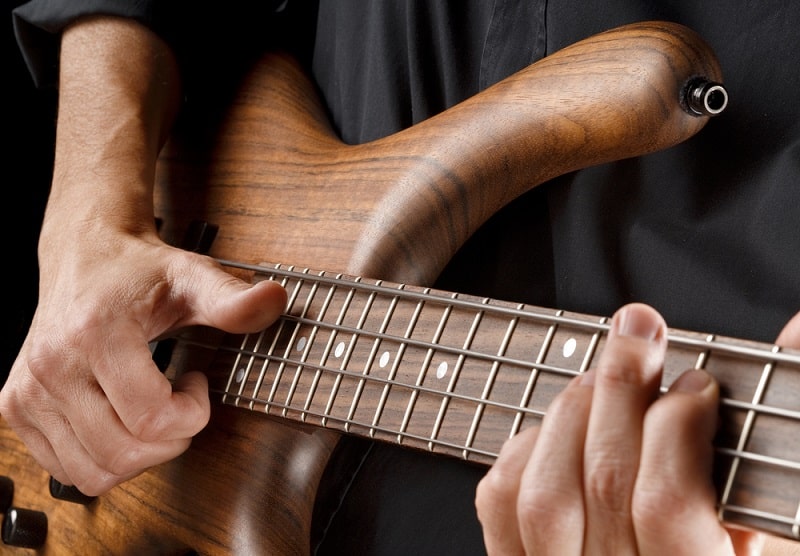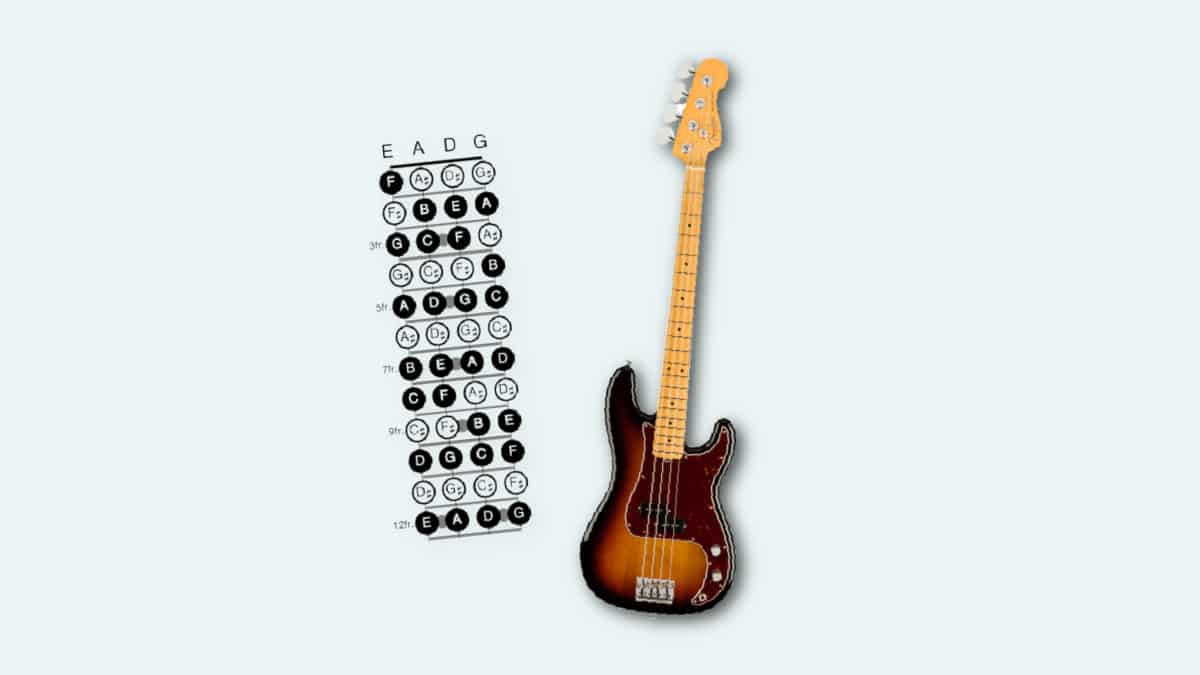In some ways, learning bass guitar seems easier than learning regular guitar.
For example, when learning bass you only need to learn notes, instead of full chords.
But bass has its own challenges, and it’s not necessarily any quicker to learn than guitar.
Today I’ll share with you a basic timeline of how long it takes to learn bass guitar, and give you some ideas about how to do it effectively.
Let’s dive in.
How Long Does It Take to Learn Bass Guitar?
There is no single answer to this question.
It depends on a variety of things, like how often you practice, your memory and muscle memory, and your natural ability.
But what does it even mean to “learn bass guitar?” When have you officially learned, and when is there still more to learn?
It’s a bit of a complicated topic, so let’s explore a bit!

3 Levels of Playing Bass
Playing bass guitar is like any other hobby. You start as a beginner, and progress through stages until you’re advanced.
The amount of time it takes to learn depends on what level you want to get to!
Beginner
As a beginner bass player, you’ll learn how to hold your instrument comfortably and in a way that doesn’t hurt your wrist.
This is also when you’ll figure out if you’re more comfortable playing with a pick or without.
You’ll know the notes on the fretboard, and be able to play a couple of songs. You may even do some finger exercises and start getting into scales.
It may take you between six months and a year to reach a comfortable beginner level.
If you’re satisfied with that skill level, then you have your answer to how long it takes to learn bass guitar!
But there’s more to be learned.
Which brings us to the next level…
Intermediate
At intermediate level, you’ll begin to master songs with more complex bass lines. You should start learning some musical theory, such as modes, triads, and so on.
At this level, you should have a good idea of what notes go with which other notes. This means you should be able to improvise and jam with other musicians in whatever key they’re playing.
It can take between a year and three years of consistent playing to reach this level.
Advanced
When you’re an advanced bass guitarist, you can pick up any guitar, any time, and play juat about anything. You won’t need to think very much about what you’re playing, or wonder what note comes next.
You can play a song by ear, off of sheet music, or from tabs. And if someone says they’re playing a song in the key of F#m, you can fall right in and jam along with no music at all.
Your improvisation skills should be advanced at this point. You should be able to play slap bass, chords on the bass, and could even become a pro studio musician.
There are prodigies who reach this level in just a few years. But the average person will reach advanced level in around 10 years if they spend a good amount of time practicing.
What Needs to Be Learned?
Unsure of how you’ll be progressing through those levels? Here’s a quick rundown of what elements you’ll need to work on when you decide to learn bass guitar.
Notes on the Fretboard
The first thing you’ll need to learn is what notes are where. This is the whole premise of playing bass! It’s the most fundamental part of learning to play the instrument.
Once you’ve learned where the notes are on the fretboard, you’ll need to practice moving to them smoothly and easily. Eventually this will become muscle memory, but it takes time!
Remember, you’ve got an entire fretboard (20-something frets) to play with! Don’t simply learn notes on the first 5 frets and leave it at that.

For fretboard mastery, you want to be able to find any one of the multiple G notes on the fretboard, for example.
Scales
Once you’ve learned where your notes are, learning scales is a logical next step. A scale is a group of notes that fit together harmonically.
The major, minor, and pentatonic scales will probably be the first ones you learn.
Why learn scales?
Well, knowing which notes fit harmoniously with each other allows you to improvise while staying in key.
Once you know the shape of each scale, you can apply it anywhere on the fretboard. This is an essential step towards learning bass guitar properly!
Groove & Timing
The bass and the drums are the rhythm section of every song. Once you know your way around the fretboard and you can use scales, it’s time to learn about groove and timing.
If you start playing in a band, you’ll get a good feel for timing. Playing with a drummer helps you improve your timing immensely. This is all about playing your notes at the right time within the bar.
Groove is something slightly different. It’s about rhythm. It’s more than simply playing your notes at the right time. Groove is all about feel of the song!
Put these two together, and you’ll notice your play will improve drastically.
Here’s an excellent lesson on groove, by Scott from Scott’s Bass Lessons. It’s slightly long, but worth the watch!
When you start playing in a band, you may want to get a bass amp. And on the less-expensive end, a metronome (or metronome app) can help with your timing.
Reading Tabs/Music
I recommend only getting into reading music and tabs after you’ve learned your fretboard and can play a few songs pretty easily.
Trying to learn this upfront can be hard and make playing music much less fun!
Now, it’s not super easy to learn how to read music (think of piano songs). That’s why I suggest learning bass guitar tabs first.
If you feel that learning to read music would be beneficial, you can do that. But if you’re not planning on going pro or playing in serious bands, there may be no need.
Bass tabs are easier as they’re a visual representation of the fretboard.
Special Techniques
You don’t just have to stick to the basics. Once you’re decent at bass, you can learn slap bass, try a 5-string or 6-string bass, a fretless bass, or work on playing chords on the bass.
Here’s a quick tutorial on the fundamentals of slap bass:
Ways to Learn Bass Guitar
Teach Yourself
This is the easiest and cheapest way to start! There’s a multitude of excellent courses online, and you should be able to learn quite a lot through free lessons.
If you’ve surpassed the free lessons, there are some top-quality paid courses out there too. For example, check out:
Another excellent way to learn is by playing in a band. A worship band may be a decent low-pressure spot to start, but many types of bands can work.
You’ll get to play with other musicians who may have advice to offer. It’s also the perfect way to practice your timing and grooves since you’ll probably be playing with a drummer.
If you have a friend who’s also learning, it could be motivating to learn together.
Go for Lessons
Going to a bass teacher is also a great option. Some people learn better when they’re able to ask questions and get individual instruction. It also creates more accountability.
Bass lessons may be more expensive than online courses. But for some people, it may be the best way to go.
On the other hand, considering you’ll need to practice at home anyway, many bassists end up learning online.
Ultimately, it’s pretty common to use more than one different resource when you’re learning.
How Often Do I Need to Practice Bass?
That depends on which level you’re aiming for. If you want to become an advanced bassist who could go pro, you’ll need to be practicing anywhere from 4 to 8 hours per day.
Sounds a little crazy, right?
For most people, though, half an hour to an hour per day is a good amount.
If you put in this amount of time consistently, you should find yourself progressing nicely.
You can increase it to 2 or 3 hours per day if you want to take your abilities to the next level.
However much time you choose to invest, consistency is key!
Conclusion
So, how long does it take to learn bass guitar? The answer really depends on you!
None of the numbers I gave in this article are exact. They’re just general guidelines to give you an idea of what to expect.
While my estimates can give you a ballpark idea, you’ll make a little bit faster progress if you:
- Practice very regularly
- Try new things
- Play in a band
- Challenge yourself
Think about what level you want to reach, and start working on it.
It’s going to require dedication, but when you’re in the groove, lost in the music, it’s totally worth it!

